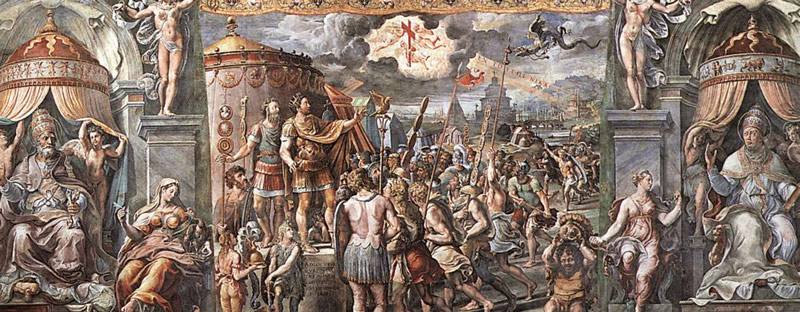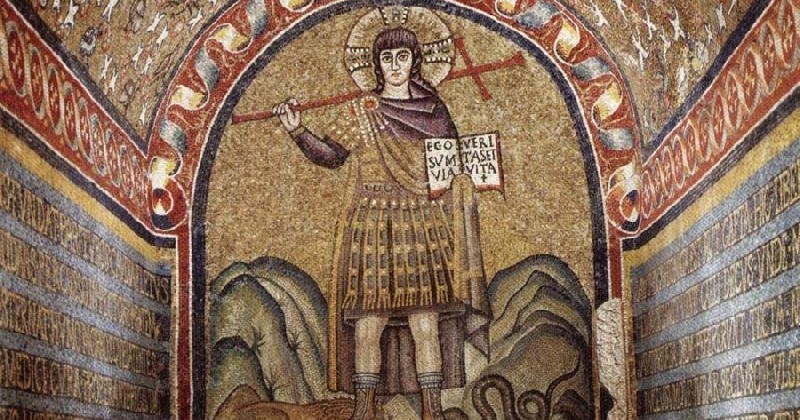Jayne Yi
Dr. Insalaco
CL CIV 201
3/29/19
Did Christianity Triumph?
In today’s world, it’s up to our own free will to choose which religion we want to be part of, and in most countries, it’s okay to have our own beliefs and practice them. However, tolerance has not always been extended to people practicing their own religious beliefs. Back in 64 AD, one of the earliest persecutions began in Rome when Nero and his ruling caused the group of Christians to suffer (Lunn, 2011). Some of the persecutions included throwing Christians to the lions, crucifying them, and burning them to death (Malik, 2010). Not only was there persecution from the outside, but there was persecution also from the inside due to dispute in the way they practiced their beliefs (Ferguson, 1990). Through trial and error, Christianity managed to survive through one of the most horrific persecutions in Rome, and it eventually became the dominant religion in the Roman Empire. Christianity still plays a big role in the world today, with nearly 31 percent of the population being a Christian (Chappel, 2015). These things raise the questions, “Did Christianity Triumph? Would the Romans have created a triumphal arch for Christianity?”

Some people might look at these questions and say that the Romans would have not built a triumphal arch for Christianity because Christianity wasn’t part of Rome from the beginning, and Christianity fragmented into different groups (Coffman, 2009). However, by understanding more of the remains of Roman history and the arts, we can assume that Romans probably would have said that Christianity did triumph, and that they would have built a triumphal arch for Christianity.
One of the big reasons that Christianity could be seen as triumphant is because it’s still around to this day. We need to understand that Christianity was one of the most severely persecuted groups in history, and that it did struggle to survive in Rome (Ferguson, 1990). Christianity gained more freedom to exercise their beliefs with Constantine and his law of issuing the Edict of Milan, a proclamation which legalized Christianity and allowed for freedom of worship throughout the empire (Constantine I Biography, 2014). After that, Christianity went through the Nicene Creed to agree on what they believed in and became the dominant religion in the Roman Empire (Donegan, 2006). Constantine had a dream of the symbol of chi roh (the first two letters of Christ in Greek forming a cross) and used the vision to conquer under that symbol. The Roman Empire isn’t around today, but Christianity is. Some may argue that Christianity is so diverse today that it has lost its identity, but the core beliefs in God the Father; in His son, Jesus Christ; and in the Holy Spirit still live today (Adams, 2001). Because Christianity still holds its core values from the early Roman period, Romans would give it credit for surviving throughout the years.

Another reason that Christianity triumphed is because of the influence it had on Roman lifestyle. When Romans wanted to remember someone or a certain event, they would preserve it by leaving behind some sort of artwork, such as arches and paintings. Some examples of arches are the Arch of Constantine, the Arch of Titus, and the Arc de Triomphe in Paris, which are dedicated to someone or a group of people. By looking at these remnants left by the Romans, we can assume that the Romans left behind a visible art or an arch if someone or some event had an influence in the Roman Empire. As an example, the Arch of Constantine was built to commemorate the victory of Constantine over Maxentius at the Battle of Milvian Bridge. Constantine later ruled the Roman Empire in his own unique way (Constantine I, 2014). Just as Constantine and his rule influenced Roman Empire, Christianity also had a significant influence, especially on Roman politics and policy (Coffman, 2009). For example, when Christianity became a dominant religion, Pagan temples were abolished, and gladiatorial games were abandoned as Christianity kept its strong hold on Rome (Donegan, 2006). In these ways, Christianity can be said to have had an influence in making Rome less brutal, in addition to removing the connection between the government and the old pagan religion.

Some of the other influences of Christianity can be seen in their art and holiday events. During the period when Christianity was the dominant religion in Rome, we could see the art where Christ is dressed up like a Roman soldier, holding a cross over his shoulder (Brownson, 1990). Also, a Roman festival called “Saturnalia” was held on 17th of December in a Julian calendar, but Christians enjoyed the festival so much that the date was extended through the 23rd of December (Salusbury, 2009). Originally, the holiday was celebrated with providing sacrifice at the Temple of Saturn, and although Saturnalia isn’t around anymore, Christmas is—which is derived from Saturnalia (Salusbury, 2009). Today, everyone around the world celebrates Christmas, and the holiday is not about providing sacrifice to Saturn anymore, but it’s to celebrate the Christian belief of the birth of Jesus.

In conclusion, Christianity influenced the Romans in many ways—politically, culturally, and religiously. What seemed like a small, weak group eventually became the dominant religion in the Roman Empire and ended up being a part of Roman culture. Without Christianity, the Roman Empire would’ve been different from how we remember it now. Because of the immense influence that Christianity had on the Romans, the Romans would build an arch for the Christians, and would say that Christianity triumphed—not only for the influence, but for surviving for decades.
Works Cited
Lunn, Sohpie. “Christianity and the Roman Empire.” Ancient History in Depth, BBC, 17 Feb. 2011, www.bbc.co.uk/history/ancient/romans/christianityromanempire_article_01.shtml.
Malik, Shushama. “Mythbusting Ancient Rome – Throwing Christians to the Lions.” Mythbusting Ancient Rome, The Conversation, 2010, theconversation.com/mythbusting-ancient-rome-throwing-christians-to-the-lions-67365.
Ferguson, Everett. “Persecution in the Early Church – Did You Know?” Christian History, Christianity Today International, 1990, www.christianitytoday.com/history/issues/issue-27/persecution-in-early-church-did-you-know.html.
Chappel, Bill. “The Two-Way.” World’s Muslim Population Will Surpass Christianity This Century, NPR, 2 Apr. 2015, www.npr.org/sections/thetwo-way/2015/04/02/397042004/muslim-population-will-surpass-christians-this-century-pew-says.
Donegan, Divillier. “The Roman Empire: in the First Century.” The Roman Empire: Worship, PBS, 2006, www.pbs.org/empires/romans/empire/worship.html.
“Constantine I – Christianity, Accomplishments & Death.” Constantine I Biography, A&E Television Networks, 1 Apr. 2014, http://www.biography.com/people/constantine-i-39496.
Coffman, Elesha. “State of the Fragmentation.” State of Fragmentation, Christianity Today International, 24 May 2009, www.christianitytoday.com/ct/2002/januaryweb-only/52.0.html.
Adams, Henry. “Christians of Early Times and Today.” Comparisons Between Christians of Early Times and Today, Harvard Classics, 2001, www.bartleby.com/48/3/3.html.
Brownson, William C. “Speaking of Jesus: A Roman Soldier.” Jesus: A Roman Soldier, Words of Hope, 8 Apr. 1990, www.woh.org/radio/speaking-of-jesus-a-roman-soldier/.
Salusbury, Matt. “Did the Romans Invent Christmas?” History of Christmas, History Today, 12 Dec. 2009, www.historytoday.com/archive/did-romans-invent-christmas.
Your use of history is really well done. I also really like how you laid out the facts about what Christianity has become and if that was really a triumph or not. I also like your inclusion of the Romans leaving behind their legacy in the form of art or arches. You did a really nice job of flowing your information along with your argument. I enjoyed reading your paper and was given a better insight on how Christianity triumphed.
LikeLike